NRL 2024: Bulldogs-Jackson Topine stoush begs the question how tough is too tough | Paul Kent
The legal stoush between Jackson Topine and the Bulldogs will bring to focus how clubs treat their players. But how does a courtroom tell an elite sporting organisation how it should train its elite athletes, writes Paul Kent.
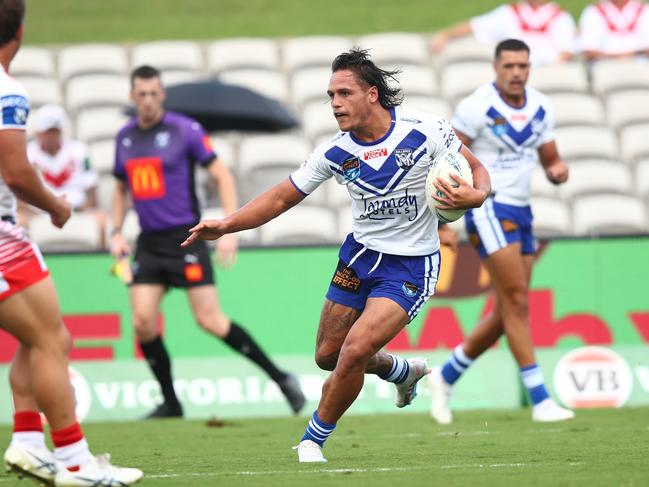
NRL
Don't miss out on the headlines from NRL. Followed categories will be added to My News.
Truth is, nobody really knows what to make of the upcoming stoush between the relatively unknown Jackson Topine and the recognised street brawlers, the Canterbury Bulldogs.
It shocked not just the rugby league world but large acres of the sporting landscape when news broke this week that Topine was suing Canterbury for a training session that got a little too tough and maybe even a little nasty shortly before he left the club last year.
It caused more than a few to scratch their chins and ponder, how tough is too tough?
For many years that was the Canterbury way. Undoubtedly, whenever Canterbury are good, it is built on a foundation of granite.
When he was running the club, the Bullfrog, Peter Moore, used to have a little equation he liked to repeat that he believed summed up the Canterbury ethos.
Train hard plus play hard equals party hard, he used to say.
It seemed Topine was challenging the very fabric of sporting lore with his allegation Canterbury went overboard at a wrestling session last year.
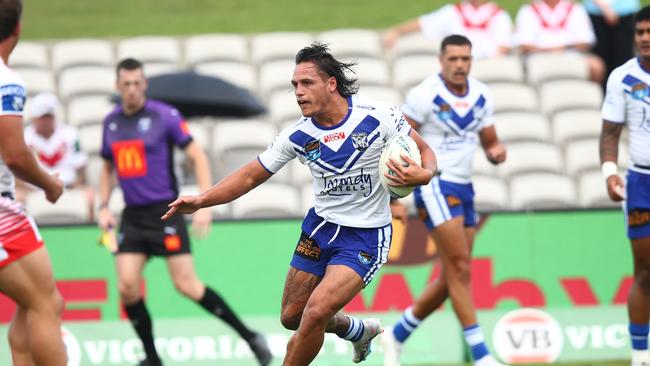
The Bulldogs claim Topine turned up late to training one July morning and, as such, had to be disciplined.
Depending on the situation, such punishments could mean extra efforts at training, spinning a chocolate wheel with all sorts of madcaps tasks listed, or a simple monetary fine.
Topine, though, will claim he wasn’t late.
The notice said players that needed to be strapped had to report in at 8am and the wrestling session would start at 8.30am.
Given he didn’t need to be strapped, Topine thought it fair and reasonable to turn up for the 8.30am start.
Canterbury did not.
Topine wrestled with his teammates for 90 minutes and then, with a brutal flourish, was ordered to get into the middle of the wrestling mat and, one after the other, on 30 second rotations, somewhere between 30 and 35 players took turns wrestling him.
They call it shark bait, and Topine was wet lettuce by the end.
The session took all he had and, it seems, all he might ever have.
He was chosen as 18th man for the Bulldogs and trained the next day but the following week he took sick leave and never made it back.
Topine claimed he suffered a mental breakdown.
He left in November.
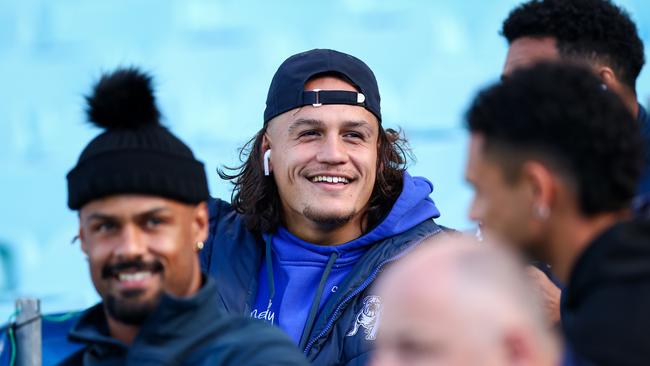
The issue for the courts will be what exactly happened during that added wrestling session.
The thinking is that at some point the punishment went too far. That somebody should have recognised it had shifted from punishment to humiliation and should have stopped it.
Also unknown is how Topine was treated throughout the extra session.
How embarrassed or humiliated was he?
The Rugby League Players Association has watched on closely and questions whether Canterbury would at all be interested in letting the courts peek behind the curtain at what happens inside its club.
The case will certainly bring focus to how clubs treat their players.
The hearing is listed for a hearing in the NSW Supreme Court in July.
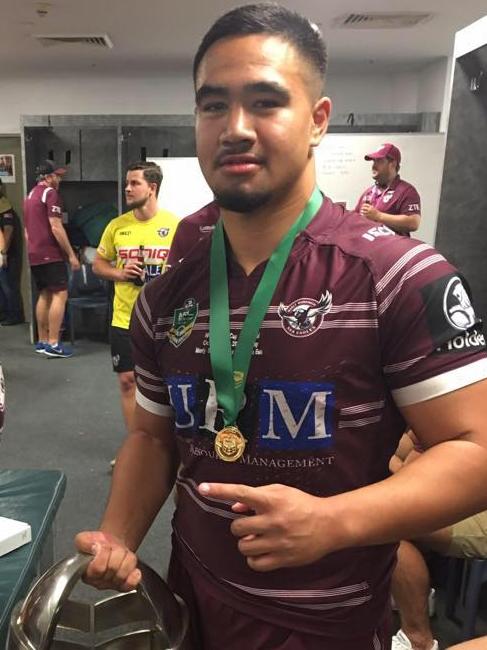
It is expected it will be heard sometime after the findings in the coronial inquest into Keith Titmuss’s death at a Manly training session in 2020 are released.
The inquest is considering all possibilities, including that Titmuss had an underlying medical issue but also that he could have been pushed to levels he was not properly conditioned to handle.
There are so many unknowns.
On the flip side, if Topine didn’t like what he was doing, why didn’t he simply stop doing it?
The simple answer is it simply doesn’t happen inside clubs. Players are trained to never quit and not ask questions. They do moan a bit.
But if Topine’s case is a simple workplace issue, as some are trying to claim, then telling the boss that a direction is not fair and he won’t be doing it would not be considered uncommon.
But Topine didn’t.
How tough is too tough?
The sporting world is filled with examples of athletes who endured cruel and unusual punishments to make it to the top.
In most cases, too, it was entirely self-enforced.
If being an athlete was easy, we would all do it. Train for a couple of hours a day and live large.
Beautiful.
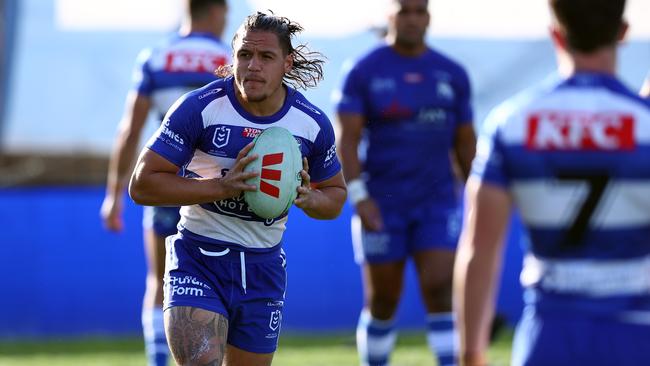
A player’s mental make-up is as important as anything else in his toolkit.
Some players don’t make it because they simply are not fast enough. Some just don’t have the engine to. Some are not smart enough.
All are physical limitations. But the mental make-up is equally as important.
How much the courts can determine what is satisfactory treatment inside a football club is also a great unknown.
When the Super League war broke in 1995 the Australian Rugby League responded by failing to select Super League players for the State of Origin series.
Super League took the ARL to court on behalf of its players, arguing a restraint of trade by banning them.
The ARL argued it didn’t ban them at all, they simply picked who they believed were the best players for each state, which was ludicrous.
The court ruled it was unlawful to ban the Super League players but admitted it had no power to enforce itself on selections. Those were decisions for the selectors.
And that’s the similarity with this case.
How does a courtroom tell an elite sporting organisation how it should train its elite athletes?
Football clubs are not normal workplaces.
Not every workplace is the same, nor should be.
When the army trains its soldiers, for instance, discipline and toughness are essential. The belief is steel sharpens steel and so the soldiers are trained to, and sometimes beyond, breaking point.
As well as sharpening their skills, it has the duel effect of also weeding out those unsuitable for the job.
All the defence forces, even the police, are different work environments than you might find at H&R Block or leaning against a stop and go.
When your life depends as much on the man beside you as it does on yourself there is an expectation that training and standards are of the highest standard.
It is the same in sport.
Nobody ever trained soft on their way to greatness.
****
The problem with banning the kick-off is, what’s next?
It sounds absurd, but what is the logical end?
If tackling is essential to rugby league, which it is, and the NRL can’t ban the tackle, then how close do we get before we pull up?
While Moses Suli’s concussion from a kick-off on Thursday has again lit the debate for whether or not the kick-off should be banned, nobody has noted how Suli’s technique contributed to his own demise.

He was bolt upright when he was run into by Jared Waerea-Hargreaves. As happens in almost every instance, their heads were trying to occupy the same space at the same time and so the hardest nut prevailed.
And the madness is, this is a technique being taught in the game.
What is more worrying, kids as young as nine and 10 are being taught the “catch, hold and wrestle” technique because that’s what they see the big boys doing in the NRL.
A concerned father, with a history in the game, contacted me this week worried about the tackle techniques being taught to children so young.
Other parents, he claimed, were equally as concerned.
Most solutions to tackle the worrying amount of concussions in the game are band-aid solutions, like banning the kick-off.
They are prevention not cause type adjustments, shifting where the concussion will occur.
Until a change in tackling technique happens, which can only be coached into the game (and no coach will change until forced), it is just going to keep happening.
More Coverage
Originally published as NRL 2024: Bulldogs-Jackson Topine stoush begs the question how tough is too tough | Paul Kent





